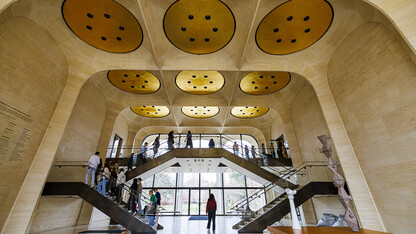· 3 min read
NU System moving forward to address fiscal challenges

The University of Nebraska System continues to move forward on its Five-Point Plan to successfully navigate the challenging higher education landscape, System President Ted Carter told the Board of Regents Oct. 5.
In remarks to the Board during its meeting on the University of Nebraska Medical Center campus, Carter highlighted steps NU leaders have taken since unveiling the Five-Point Plan to regents in June. With the plan, the university aims to address fiscal challenges brought on by inflation and muted revenues while also better prioritizing its resources for future growth. Central to the plan is a goal to gain readmission into the Association of American Universities, a coalition of the country’s most prestigious research institutions.
“This is the time for us to rethink the way we operate and invest in priorities that will move this university and our state forward,” Carter said.
“Our challenges are real, but we are going to use them as an opportunity to get better, to grow, to become more competitive, more efficient and more impactful for Nebraskans.”
Recent action steps include:
• Campus financial aid directors have shared feedback on NU’s Regents Scholarship program and potential total cost of attendance scholarship models, part of the university’s goal to offer more competitive scholarship packages to attract top students. Carter credited the financial aid directors for their valuable input and said the next step is to ask the University of Nebraska Foundation to study the feasibility of raising private funds for total cost of attendance scholarships.
• The university is building a dashboard that will allow leadership teams to measure NU’s performance against AAU membership indicators. University of Nebraska–Lincoln Chancellor Rodney Bennett and UNMC Chancellor Jeffrey P. Gold are set to be briefed on the dashboard model later this month.
• The university is also building a dashboard that will allow for more proactive measurement of NU’s academic programs against Nebraska Coordinating Commission for Postsecondary Education performance standards. Carter noted that the CCPE’s minimum performance standard for bachelor’s degree programs is seven graduates per year over a five-year average. The dashboard will allow regents and university leaders to intervene in real time if programs are falling short of CCPE standards.
• Reviews are under way of the university’s investments in its system-wide institutes to determine whether they can achieve a greater return in federal research funding, a key metric for AAU membership.
Carter previously shared in an email to all faculty and staff that a modified zero-based budget effort is under way, including a review of non-faculty staffing to assure that expenses are justified. The university is also reviewing functions that remain decentralized or distributed across the system, including information technology, facilities, public relations and communications, business operations and student services. Chancellors have been asked to complete reports by Dec. 1 that will inform conversations between Carter, the vice presidents and chancellors about alignments and staffing that make the most sense for the university system.







